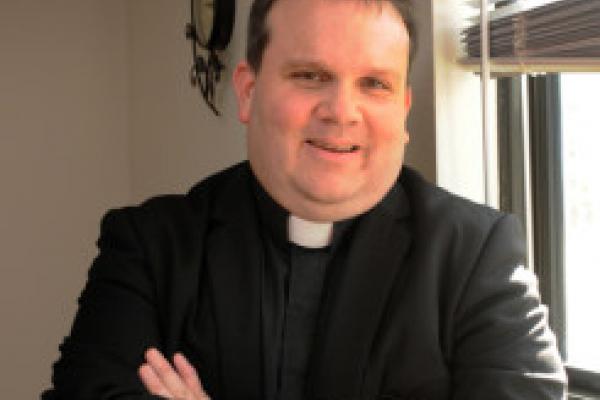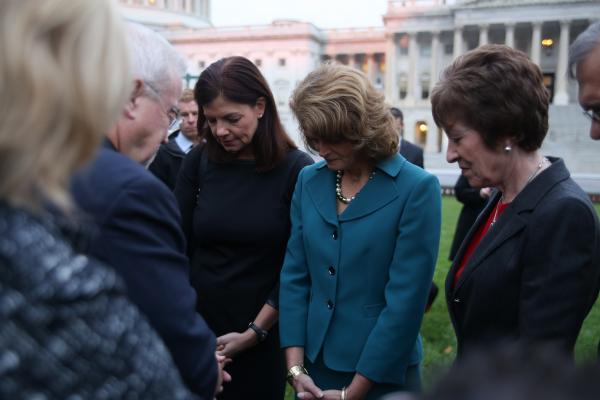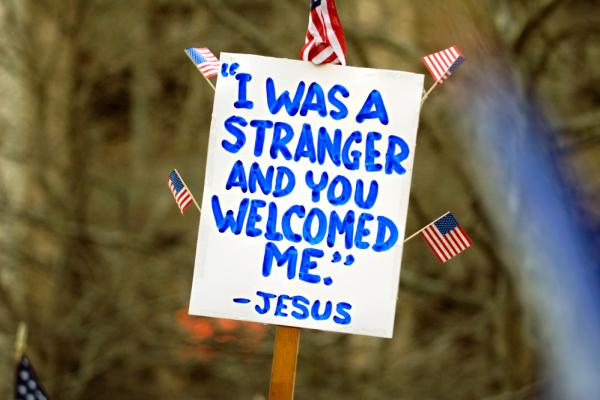The Rev. Ray Leonard knew not to wear the clerical collar identifying him as a Roman Catholic priest. It almost certainly would have gotten him deported.
He knew not to celebrate Mass, hear confession, or baptize a child. The acts might have resulted in harassment — or worse, arrest and imprisonment — for the families Leonard cared about.
During a decade spent teaching and helping the needy in some of China’s most impoverished and oppressed regions, the New Jersey priest learned what it was like to live in a land without religious freedom.
It kindled a greater appreciation for his liberties at home. Which is why Leonard, 51, bristled at the U.S. government when it told him he couldn’t hold services at a Georgia naval base during last month’s government shutdown. Leonard, a civilian contractor on the base wasn’t deemed an “essential” employee.
In the short three months that I have been at Sojourners as the director of individual giving, I’ve been humbled and inspired by the countless social justice activists who make up our community. In these three months, I have witnessed activism for immigration reform, a vigil for those most affected by congressional dysfunction, organizing for climate change, a prophetic stand for racial justice, the launching of a new campaign to empower women and girls, and much more.
Every family, including my own, has its “keepers” and “givers.” There are those who keep and hoard every tiny little trinket, every old letter, and every unneeded refrigerator magnet. Then, on the other side of the spectrum, there are others who give away every extraneous and unused thing, living in radical simplicity.
Over the past six years, I’ve attempted to be more the latter than the former. The simplicity movement has been growing for years and is challenging our assumption that more is better. Graham Hill, in a provocative little talk on the topic, has pointed out what our big houses, our lots of things, our endless splurging has done.
Today, the average American has three times as much space as 50 years ago. Our insatiable lust for things has birthed a virtual cottage industry of storage space facilities. The modern storage industrial complex brings in some $22 billion a year. We must learn, Hill argues, to edit our possessions down to what matters and what we actually use. Let the rest go. Clear the artery of our clogged lives.
When he was asked how he would like to be remembered, former president Nelson Mandela was very clear: “I would like it to be said that, ‘Here lies a man who has done his duty on earth.’ That is all.”
It so happened that I had dinner on Nelson Mandela Square in Sandton, Johannesburg, on the night that he died. At the time I was unaware of his death — like most of South Africa I woke up with the news the next morning. The huge statue in the square and the nearby shop selling memorabilia would probably be the furthest removed from how Madiba himself would like to be remembered, but I suppose he realized that this was inevitable for someone who had become a global icon of freedom and justice.
In the famous Rivonia trial where he received a life sentence for his role in fighting the apartheid system, he said the following of democracy: “It is an ideal which I hope to live for and to achieve. But if needs be, it is an ideal for which I am prepared to die.”
And so it begins: “The Reason for the Season.”The bumper stickers and fridge magnets are flooding my mail box and being slapped into my hands kindly by ushers. Church signs from all denominations proclaim: “Jesus is the Reason for the Season!”The phrase has become ubiquitous.
But for me, it’s like nails-on-chalkboard. Indeed, he is the reason. Though we should probably draw our camera back for the wider view on the reason: God’s love (for he so loved the world … well, you know the rest). It is not the accuracy of the slogan that makes me cringe (because it is accurate), but rather, because it’s fluff. It is the religious equivalent to sappy pop music.
“Let’s keep Christ in Christmas!”
“Jesus: the gift that keeps on giving!”
Given the magnitude of Christ’s birth, are these slogans the best we can do?
In his book titled Fasting, Scot McKnight writes that a grievous sacred moment is what prompts us to fast and that moment is often caused by severe pain, suffering, or sorrow, which often includes the oppression of the innocent. This sorrow prompts us to focused prayer and fasting.
I entered a sun-up-to-sundown, water-only fast as part of the National Call to #Fast4Families on Dec. 3.
I fasted because of a strong conviction concerning the broken and unjust realities of the American immigration system. For our generation, immigration reform is a biblical justice issue.
The world lost a hero yesterday. Nelson Mandela, 95, died at his home in Johannesburg, South Africa, after a long illness.
From prisoner of 27 years to President of his country, Mandela exhibited courage and vision for a country that had feared a bloodbath in its transition to a post-apartheid society. Mandela united the country through the Truth and Reconciliation Commission.
A less-noted aspect of Mandela’s work was his founding of The Elders on his 89th birthday. With a mission of “offer[ing] their collective influence and experience to support peace building, help address major causes of human suffering and promote the shared interests of humanity.” Mandela gathered Jimmy Carter, Kofi Annan, Mary Robinson, Desmond Tutu, Muhammed Yunus, and others to harvest the wisdom of their years for the good of the planet. Founding member Peter Gabriel further explained: “In traditional societies, the elders always had a role in conflict resolution, long-term thinking, and applying wisdom wherever it was needed. We are moving to this global village and yet we don’t have our global elders. The Elders can be a group who have the trust of the world, who can speak freely, be fiercely independent, and respond fast and flexibly in conflict situations.”






